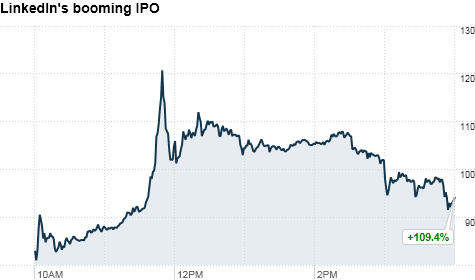
LinkedIn's IPO was a massive success, setting the stage for Facebook, Twitter, Groupon and Zynga to debut.
NEW YORK (CNNMoney) -- LinkedIn's IPO was a hit Thursday, thanks to pent-up demand for shares in tech startups.
The other "big four" buzziest private companies -- Facebook, Twitter, Groupon and Zynga -- are keeping watch as they prepare their own public debuts.
LinkedIn shares opened at $83 each in its first day of trade, a whopping 84% above its initial offering price of $45 a share. Soon they crept up to $90. Then $105. Shares ultimately reached a high above $122 before closing near $94.
That values LinkedIn (LNKD) at about $9 billion -- an eye-popping number that has implications beyond a single company.
"LinkedIn's performance suggests there is going to be massive excitement around the likes of Facebook, which is even bigger," said Max Wolff, senior analyst at GreenCrest Capital, a firm that tracks private companies.
LinkedIn is a strong company in its own right, Wolff noted, with three revenue streams and a 2010 profit of $15 million -- but that's not enough to explain Thursday's wild ride. Instead, it's about displaced demand for access to tech startups, particularly in the social media space.
"If you're dying of thirst, you'll accept iced tea even if you really want lemonade," Wolff said. "It's a perfect storm of fury, frustration, excitement and delay."
In fact, the other big four companies "have far more sex appeal than LinkedIn right now," said Debra Aho Williamson, principal social media analyst at eMarketer.
"The best thing about LinkedIn's model is that they were patient about going public. The others are hot right now, but most of them are much newer," she added.
When will the "big four" pull the trigger? Facebook hasn't shown much interest in going public, though it said in January that it will begin filing public financial statements by April 2012. That's likely to coincide with an IPO.
Second-buzziest behind Facebook is Groupon, which made waves by rejecting a Google (GOOG, Fortune 500) buyout offer rumored to have topped $6 billion. CEO Andrew Mason is reportedly shopping an IPO around the big banks, so Groupon may be the next to make its debut.
Twitter is in no rush to go public. Dick Costolo, now the company's CEO, said at a conference last year that an IPO is "way out."
Zynga has been a huge success thanks to FarmVille, FishVille and many other -Ville games on Facebook. But founder Mark Pincus has said he fears that going public and veering off his plan will bring "death by a thousand compromises."
What those four companies lack, however, is multiple revenue streams. LinkedIn books money from job postings, premium subscriptions and advertising.
"The other four have only one thing going for them," said Williams, the eMarketer analyst. "Facebook is ads. For Zynga it's payments on virtual goods. And if your single revenue stream dries up, you're in trouble."
The secondary market effect: Still, investors eagerly await those big four IPOs. And in the meantime they're actively trading shares on exchanges like SecondMarket, which booked $115.4 million in private-stock trades last quarter.
Facebook is valued at about $70 billion on SecondMarket, said Wedbush Securities analyst Lou Kerner, but he's unsure of the other three valuations as no publicly available trades have occurred recently.
But according to some reports, Zynga and Twitter may each be valued at more than $7 billion, while some have suggested Groupon may be seeking a $25 billion valuation in an IPO.
SecondMarket doesn't disclose pricing or implied valuation for the private companies traded in its exchange, but it released details on LinkedIn after its public debut.
LinkedIn shares began trading on SecondMarket in April 2010, and it ended the month at $14.50 a share. By March 2011, shares were at $35 each -- less than half of LinkedIn's closing price Thursday. A rep for SecondMarket said LinkedIn was its third most frequently traded stock.
SecondMarket said in a statement that the LinkedIn debut was a "much-needed boost for the IPO market."
But it noted that the IPO "underscores the point that even for an exciting, innovative company like LinkedIn, it can take nearly a decade before the time is right to go public."
That's likely because Wall Street doesn't want to get burned again.
Emerging from the dot-com bust's shadow: The burst of the tech bubble drove a wedge between Wall Street and tech startups in the early 2000s, and Wolff said some investors may be trying to cash in on these companies after waiting too long.
"A lot of investors feel burned by tech," Wolff said. "Now, the people who are late to the startup investment party are pushing their way in."
But because Wall Street has been so wary of techs, investors now find themselves without much data and research on the startup sector.
"You're guessing the unknown growth trajectory of a new business model," Wolff said. "It's the equivalent of counting beads in a jar with black tape over it." ![]()